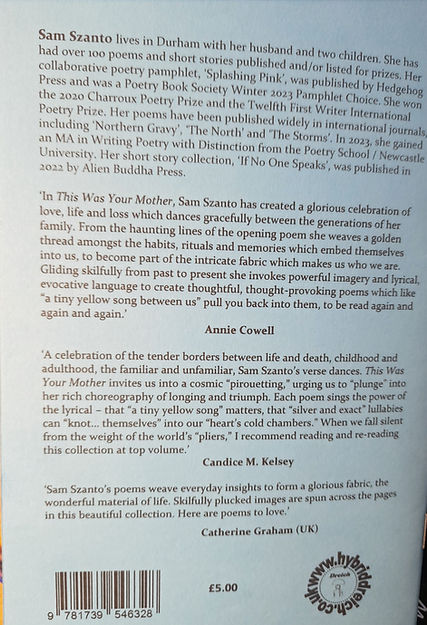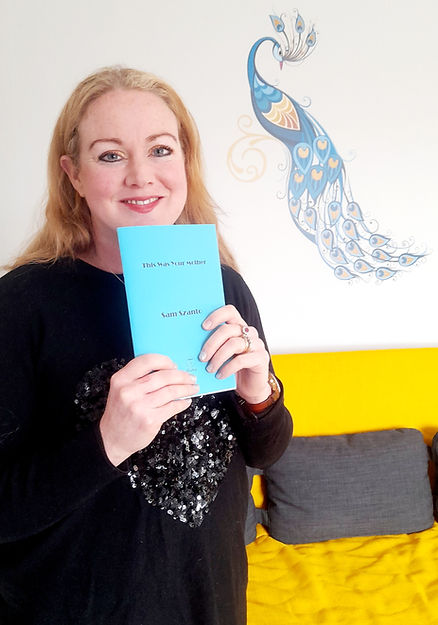20 Questions with... Emily Butler
- samszanto2
- Nov 4, 2022
- 5 min read

Emily Butler is the author of Lucid Dreaming, Waking Life: Unlocking the Power of Your Sleep (Toplight Books) and two poetry chapbooks: Ghost House (Alien Buddha Press) and Self Talk (Plan B Press). Their work has appeared or is forthcoming in The Comstock Review, Painted Bride Quarterly, Spoon River Poetry Review, Cape Cod Poetry Review, and elsewhere.
Instagram @TheEmilyButler; Twitter @EmilyFButler1
YouTube: youtube.com/emilybutler
Please introduce yourself. Where are you from? What was your life like growing up?
I’m from a small town in Eastern Massachusetts, USA. I guess one interesting detail about my upbringing is that I played in the percussion section of the band as a teenager, and was lucky enough to compete in “Indoor Percussion,” a very fun activity that most people have not heard of. I played marimba and vibraphone.
Did you always want to be a writer? If you also work, what do you do / did you do?
Yes, I always wanted to be a writer. I started writing for fun when I was about seven, just silly stories and poems, and keeping a journal obsessively. Professionally, I’m a librarian at a community college.
Tell us about your most recently published work in a sentence.
Ghost House is a poetry collection about climate change, therapy, meditation, and healing from sexual trauma, with a dash of dark, absurd humor.
What are you working on right now?
An adult, literary novel about a family of eccentric artists, struggling with their father’s sudden illness.
Do you have a writing routine, and if so what is it?
I wish I had a daily writing routine. I do have a seasonal routine. For the past several years, I have participated in National Novel Writing Month in November. So, I typically write a lot of fiction in the fall, edit in the winter, and turn to poetry in the warmer months when I can write outside with a notebook.
Where do you write – always in the same space, or different places? Can you write ‘on the move’?
Yes, I can write on the move, but it depends on the genre. I tend to only write poetry outside. Sometimes I brainstorm, outline, or revise fiction outside. When it comes to novel writing, I need to be on a computer, which pretty much necessitates being indoors. And I like writing meet-ups but ultimately I do my most productive writing alone, at home.
What advice do you have for other authors who are starting out? What is the best advice you’ve heard?
My advice would be: Don’t wait. Don’t wait to be ready or to have more free time. Don’t wait to be struck by a brilliant idea, or for the day when you feel like you “have something to say.” This day may never come. I personally believe that everyone has something to say. Often it is best to go ahead and do the saying bit first, and see what exactly it is you said later. Writing is a process of discovery. It can be enough to simply enjoy writing and want to get better at it. You don’t need to be given permission to write. Or if you do, here: I give you permission.
The best writing advice I’ve heard is that in the revision stage, you need to become a student of your own work. So, read it like you would a book for a literature class. This has been a major perspective shift for me as I work on revising my novel.
Do you enjoy doing live readings or are they a necessary evil – or somewhere in between?
I love readings! I used to perform stand-up comedy, pre-pandemic, so I like being up in front of a crowd. I hope to return to both readings and comedy when I feel safer doing so.
Are there recurring themes in your work? Where do you feel these emanate from if so?
In poetry, I simply can’t stop writing about climate change, as much as I would love to stop thinking about it. In fiction, I’m interested in artists, writers, the concept of talent, jealousy, things of that nature. I try to resist but can’t help putting writers in my fiction and playing with the opportunities that arise there, such as having a character’s poetry appear in the context of a novel. There are also recurring places in my writing. Art galleries and college campuses, for example. I write about the things and places I love, or obsess over, or need to work through in my mind.
Should writers have a moral purpose? What is the purpose of a writer in today’s society?
Not necessarily. I’d say, write about ethics if you want to, if that’s what drives you. Personally I think the primary purpose of writing is to entertain and that we don’t need loftier goals than that.
Do you write between genres or not?
Absolutely. I write poetry and fiction, and have written some creative nonfiction in the past. I have several novels in progress: a romance, a young adult fantasy, a literary novel. I change genres to keep myself interested in the work, and so that I feel like I’m never running out of ideas. I read in all genres as well.
Which living writers do you most admire?
Poets: Molly McCully Brown, Kaveh Akbar, Rachel Zucker, Topaz Winters
Fiction writers: Kelly Link, Yoko Ogawa, Mona Awad
Which dead writers do you most admire?
I don’t read a whole lot of dead authors anymore, to be honest with you.
Spalding Gray. Donald Barthelme.
What’s the book you wish you’d written?
The Strays by Emily Bitto. (Funny that we have the same first name…)
I love reading about families of artists, and this book also captures the excitement of childhood friendship, and what it’s like to want to be a part of someone else’s family but knowing you’ll always be outside of it.
What other external influences do you have: nature/place, music etc?
I played music for many years, and have written a dozen or so songs. There is obviously overlap between writing lyrics and writing poetry. Stand up comedy is a big influence on my writing as well. I actually think that stand up and poetry are quite similar. They both rely on the element of surprise, unexpected turns, tone, and space (white space on the page, or pausing for the right duration as you speak).
Do you suffer from ‘writer’s block’ and how do you overcome it if so?
No, I can’t say I’ve ever had writer's block. National Novel Writing Month has taught me how to shut off my inner editor and just write. Certainly there’s times when I don’t feel like writing, but when I make writing a priority, something useful always comes of it eventually. If I really don’t feel like writing, I journal, or switch projects. Reading helps me feel inspired. I have a bank of writing ideas in a document that I turn to if I need to start something new.
What’s been your favourite reaction to your writing?
This isn’t going to sound very nice… but I wrote a couple of essays that people have told me made them cry. It made me feel good to know that I had elicited that strong of a level of emotion in another person, just through words on a page. I figure that for them to have shed real tears, that feeling must have been genuine. I made them feel something.
How do your family and friends feel about your writing?
They’re all very supportive. I’m lucky to have a number of writer friends (and family) whose feedback especially means a lot to me.
Do you have a favourite bookshop?
Shoutout to Book Moon in Easthampton, Massachusetts, owned by one of my favorite writers, Kelly Link!
How do you see the future of writing? Will we become more or less dependent on Amazon?
When I think of the future of writing, I figure it’s much like the rest of the future: frankly pretty bleak. I ask myself all of the time what the point of writing is on a dying planet. That’s much of what Ghost House is about. I don’t know the answer. Unfortunately I think Amazon will only grow.










Comments